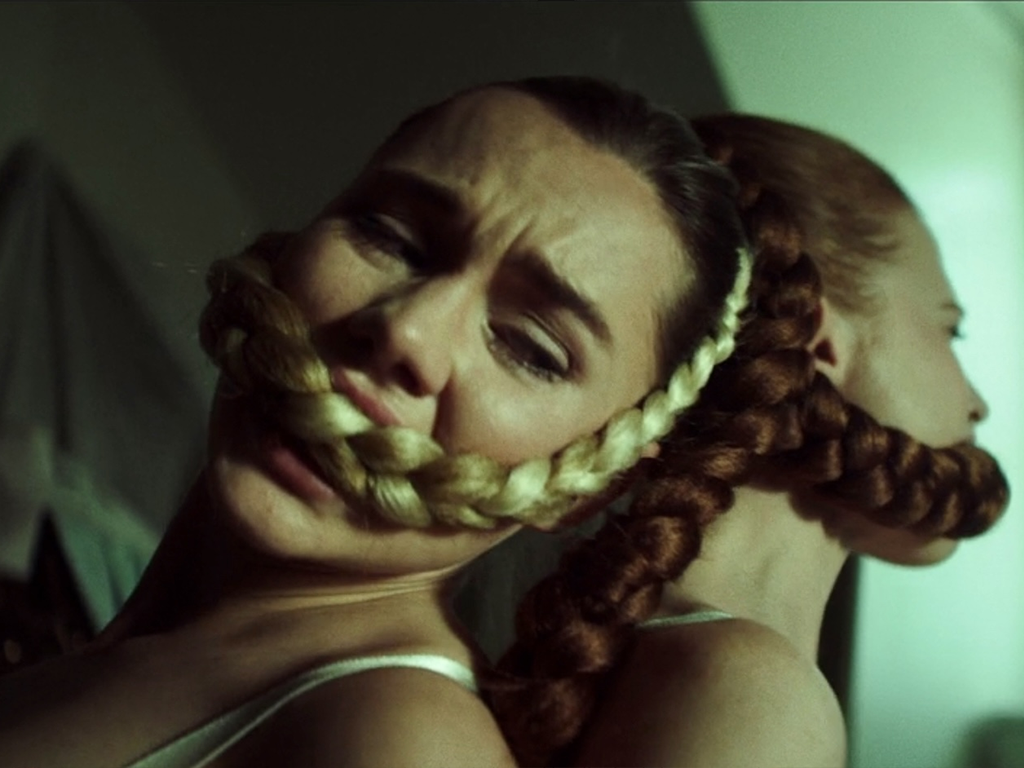Vibe:
Have you ever done too many psychedelics and experienced ego death? This movie is like that, although a little less terrifying. I'm not sure how I would categorize it genre-wise. It's not exactly a horror, psychological thriller, or art-house film. It has aspects of each of those but tying it down to any singular convention is a lost cause. If you go into it hoping for jump scares, you'll be sorely disappointed; however, it 100% delivers on disturbing imagery.
I'm hesitant to say more because this movie is best enjoyed cold. The less you know and expect, the better.
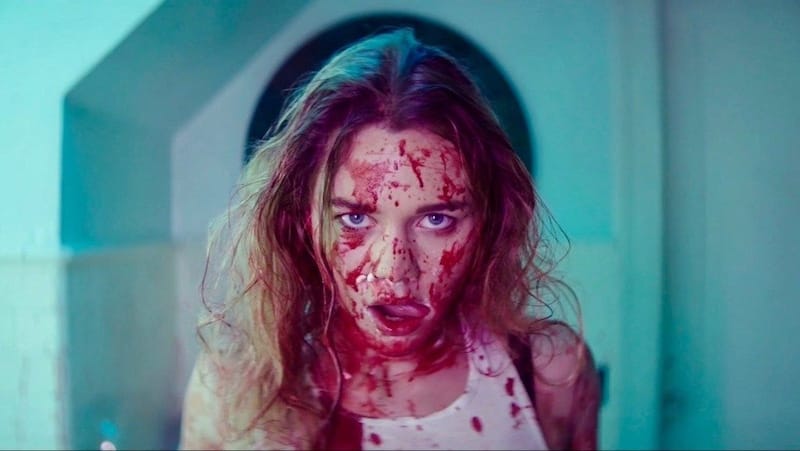
Best time to watch:
Stream it right now, at the start of spooky season. It's the perfect thing to ease you into creep and gore without going overboard. If you want to have a mini marathon, "Braid" pairs well with many of the other female-driven horror films I've reviewed. I recommend setting up a tent in your backyard and watching it on an iPad along with "The Book of Birdie" (Schuch, 2017) and Raw (Ducournau, 2017). You'll be thoroughly spooked but not up all night, worried about getting hacked to death with a chainsaw.
Worst time to watch:
Pass on this movie if you're not in the mood for cerebral mindfuckery and an extremely loose plot. Although I enjoyed it tremendously, I could easily see myself disliking it under different circumstances. The writing is incredibly thin and character development is basically nonexistent; however, "Braid" isn't diminished because of these missing elements. It's more concerned with vibe and experience than traditional storytelling.
My college boyfriend would have called it "pretentious," which is basically the label he gave anything he couldn't immediately understand (dumbass). If you come home after a hard day at work and want to veg out on the couch with something mindless, this is not your movie.
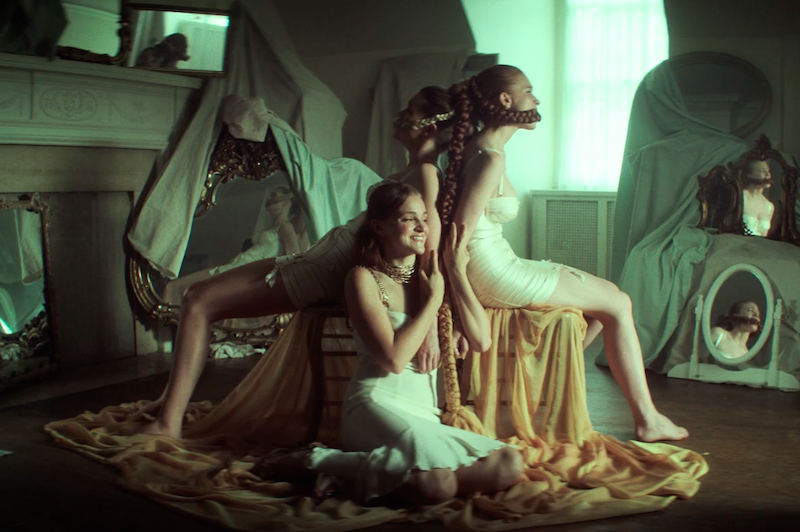
Where to watch:
"Braid" is streaming on Amazon Prime starting at $2.99, along with all of the other typical suspects (Vudu, YouTube, Google Play).
Quick summary:
Petula (Imogen Waterhouse) and Tilda (Sarah Hay) skip town after their drug operation is raided and head to the home of Daphne (Madeline Brewer), their wealthy childhood friend, in hopes of obtaining some money. Daphne is happy to help her old friends ... as long as they play by her (extremely fucked up) rules.
Thoughts:
I have purposely avoided reading any interviews with Mitzi Peirone (the writer/director) because I don't want her comments to influence my opinion. This is the type of movie that is open-ended enough to warrant many valid interpretations, and I'm going to give you mine. After I finished "Braid," my first thought was that it's a film about the indelible marks of childhood trauma. Like the 3 strands of a braid, the past, present, and future meld together and exist simultaneously. We think time exists linearly, but it's really more like a flat circle (thanks, Rustin Cohle).
I've luckily never experienced anything too horrific as a child, but even the small stuff has stuck with me over the years. I grew up playing with neighbor kids who were insensitive little dickholes. They would drag me out into the woods by their house to play, then run away from me, leaving me stranded, as soon as it started to get dark. I knew they weren't really my friends, but I longed for their approval. They're probably at least partially to blame for the years I spent dating mean guys, hoping that one day they would like me.
The three women in "Braid" have experienced much worse. In the first 10 minutes, we see brief flashbacks of Petula, Tilda, and Daphne as girls. They're in a treehouse, playing some kind of make believe game where Daphne is the mom; Tilda is the daughter; and Petula is the doctor. Apparently, the girls play this game "every day" and Tilda is sick of it. Petula doesn't seem too jazzed, either, but she goes along with Daphne's demands that they "must play."
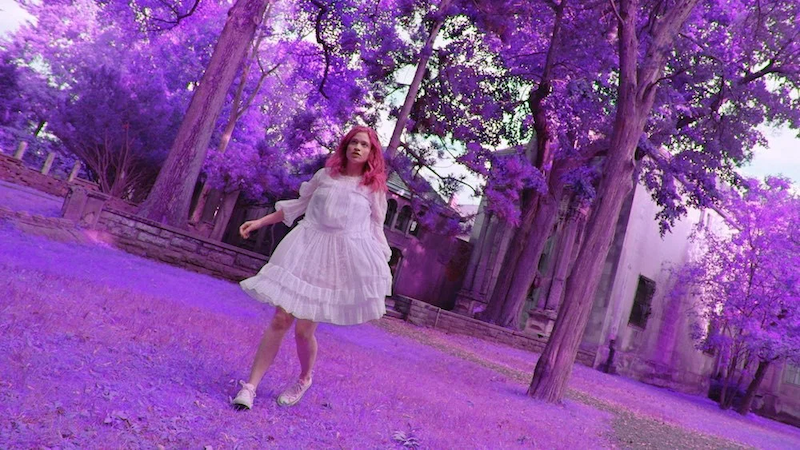
As an adult, Daphne is still obsessed with the same old games and unable to distinguish fantasy from reality. Tilda and Petula don't suffer from the same delusions but indulge her to get what they want. Daphne calls the shots and her friends follow the rules, which the film presents as intertitles:
- Everyone must play
- No outsiders allowed
- Nobody leaves
In the midst of the game, adult Tilda takes PCP that she mistook for Vicodin and everything turns candy-colored. In a vivid hallucination, the little girls reappear and show us the conclusion to the previous treehouse scene. As the girls argue over the game, a physical struggle ensues, and Daphne falls (or is pushed) out of the treehouse. Detective Siegel (Scott Cohen aka Max Medina) investigates the incident. When he asks the girls how exactly Daphne fell, Petula smiles and tosses him a little yarn doll, as if to say that it was all just a game.
Unfortunately, the world of make believe is not immune to reality. Daphne looks okay after the fall, but a doctor reveals that she's suffered internal damage that makes it impossible for her to ever bear children.
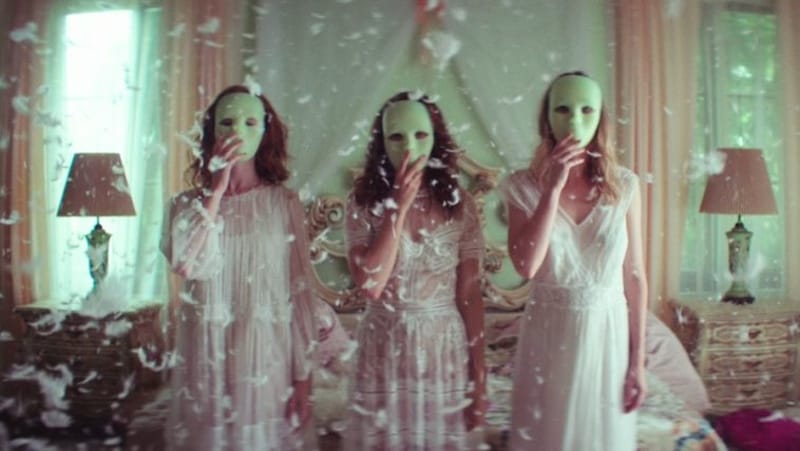
In the wake of this revelation, some of the nonsensical begins to make sense. Adult Daphne can't get over the trauma that she experienced as a child. In order to gain some semblance of control over her situation, she forces her friends to reprise their old characters and abide by her 3 rules. This time, Daphne isn't the one to experience a violent injury. Tilda takes a blow to the knee; Petula's cheeks are slashed like the Joker's. None of those injuries last, though. In subsequent scenes, all evidence of harm disappears.
What is real and what is fake? How do we reconcile different parts of our identity over time? How do we deal with the horrors of life without occasionally succumbing to madness? "Braid" asks all of these questions and doesn't offer up any clear-cut answers. It understands that people are the sum of their experiences, and that the past can catch up with the present at any time. There are infinite possible reactions and outcomes to any given event. We resent, forget, forgive, remember, and learn ... sometimes in that order, but more often jumbled and spread out over time.
Tilda and Petula aren't without their own issues. They weren't physically damaged by what happened in the treehouse, but it was a notable event in their lives. They're still making dumb choices (dealing drugs, running from the cops) and are willing to regress into childhood nonsense to escape consequences. They describe themselves as artists, but what exactly are they creating? A living, breathing, chaotic performance piece? Is life art?
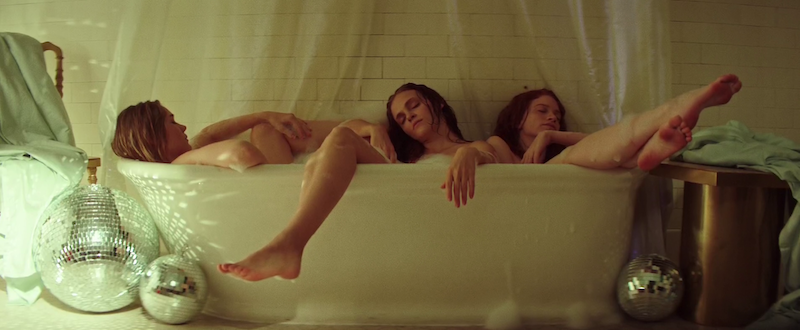
We all tell ourselves stories and adjust our perceptions to make existence as tolerable as possible. Instead of being a mentally ill, grief-stricken shut-in, Daphne is a mother. Tilda and Petula go from drug dealers on the lam to struggling artists. At one point, Daphne claims to be pregnant and has this exchange with Tilda:
Tilda: There's no baby coming. You're not a mother, you're a monster. This is not happening. It's not real.
Daphne: Thank you, I always knew I'd be an excellent mother.
Tilda: Daphne, wake up!
Daphne: I am awake! It's everyone else that's asleep.
Who's to say she's wrong? After all, what we're watching is not real. These women are all characters, painstakingly created for us by someone else. Our only truth is what the film reveals. In life and in art, perception is our reality. It can melt together, shift backwards and forwards. As soon as we stop abiding by the rules, everything breaks. Figuring it out becomes meaningless, and it's easier to just surrender to the flow. It seems that life is a repetitive series of games, played over and over again as death tightens its grip.
Stray observations:
- I'm super obsessed with Madeline Brewer. She always chooses really interesting roles and slays them all.
- I loved Scott Cohen's murder scene. Suck it, Max Medina! That's what you get for trying to eat Shredded Wheat with water, you sick fuck.
- Everyone in this movie is awful. The only person I like is the homeless man who calls one of the girls a witch.
- I hope we can all agree that literally nothing is creepier than child art.
- Why does Daphne own so many Jell-O molds?
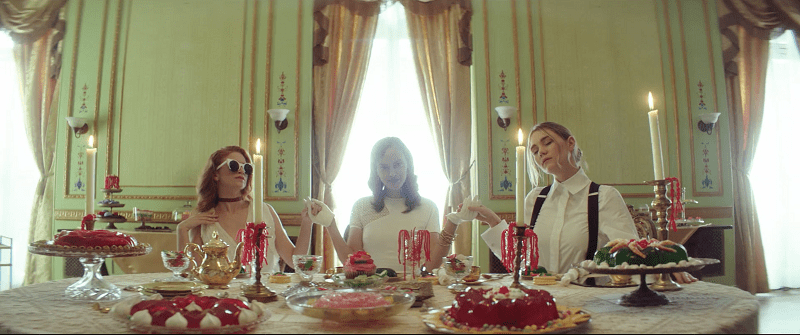
- Daphne's mansion is actually Alder Manor in Yonkers. I once attended a beautiful wedding here. It was a very different experience.
- I loved the continuous shots that took us from the mansion bathroom to the train bathroom, the gum under Daphne's seat to the gum under the train seat.
- Most disturbing image = the hooks on the ceiling.
- The three primary characters are so thin that I consider them to be the same person, like a holy trinity.

